
While a shiny coat can be a sign of good health, underlying issues might be lurking beneath the surface. Regular vet check-ups are crucial for monitoring your pet's coat condition and overall well-being. These visits not only help identify potential skin problems but also pave the way for preventive care that keeps your furry friend healthy. Understanding the vital connections between routine care and coat health can make a significant difference in your pet's quality of life.
Key Takeaways
- Regular vet check-ups help identify early signs of skin infections, preventing severe discomfort and promoting overall coat health.
- Vets assess coat condition during visits, detecting potential irritations or parasite infestations that could compromise coat quality.
- Vaccinations during check-ups bolster the immune system, indirectly supporting skin health and maintaining a healthy coat.
- Professional treatments offered at vet clinics can address specific skin issues, enhancing the coat's appearance and texture.
- Consistent health care routines, including regular vet visits, play a crucial role in maintaining optimal coat condition and overall well-being.
Understanding the Link Between Coat Health and Overall Well-being
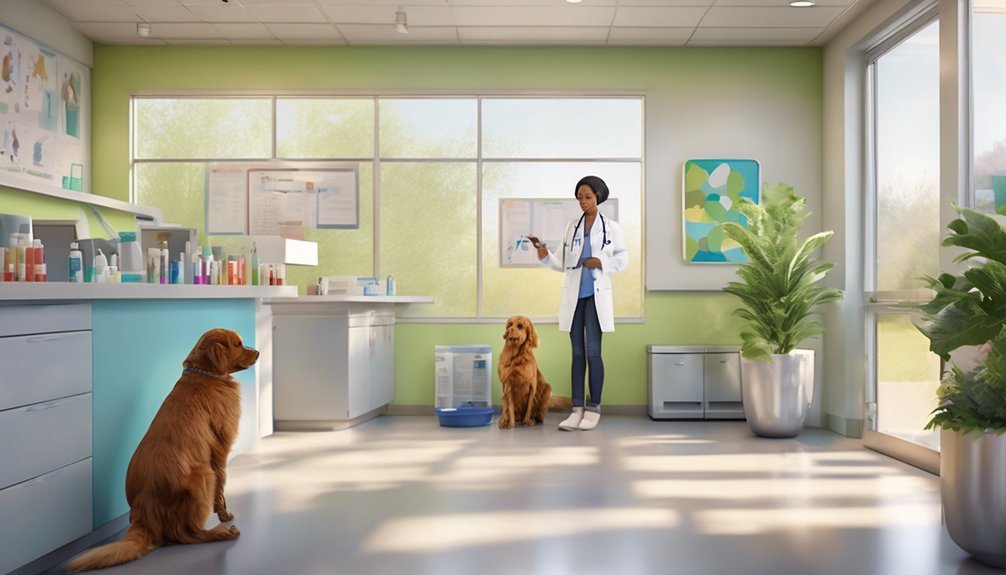
When you consider your pet's overall well-being, it's essential not to overlook the condition of their coat, as it often reflects their internal health. A well-hydrated coat indicates that your pet is receiving proper nutrition and care.
Ensure your furry friend stays hydrated, especially during seasonal shedding periods when their coat may require extra support. Regular grooming not only helps remove loose fur but also stimulates the skin, promoting better coat hydration.
Pay attention to any changes in texture or appearance, as these can signal underlying health issues. By prioritizing coat health, you're nurturing a vital aspect of your pet's overall quality of life, fostering a deeper bond with your beloved companion.
Common Skin Issues Detected During Vet Visits
Regular vet check-ups play a vital role in identifying common skin issues that might affect your pet's coat health.
During these visits, your vet can detect skin infections, which often manifest as redness, swelling, or discharge. Early identification is crucial, as untreated infections can lead to severe discomfort for your furry friend.
Additionally, coat parasites like fleas or ticks can wreak havoc on your pet's skin, causing itching and hair loss. Your vet will assess your pet's coat condition, checking for any signs of irritation or infestation.
The Role of Parasite Prevention in Coat Maintenance
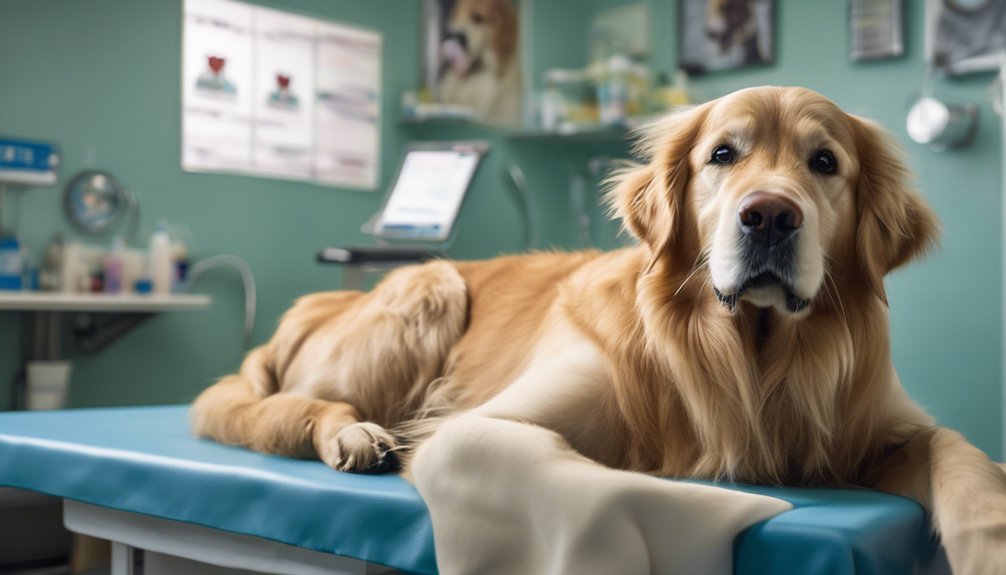
While many pet owners focus on grooming and nutrition, effective parasite prevention is equally essential for maintaining a healthy coat.
Regular parasite control helps safeguard your pet against fleas, ticks, and mites that can cause irritation, hair loss, and infection. These pests not only affect your pet's comfort but also undermine their coat protection.
By implementing a robust prevention plan, you can significantly reduce the risk of infestations that lead to skin conditions and coat damage. Talk to your vet about the best preventive measures for your pet's specific needs.
Nutritional Factors Affecting Your Pet's Coat
Effective parasite prevention sets the stage for overall coat health, but nutrition plays a pivotal role in how your pet's fur looks and feels. A balanced diet rich in essential nutrients is vital for maintaining a shiny, healthy coat.
Look for high-quality protein sources, as they provide the building blocks for fur growth. Incorporating dietary supplements, especially those containing omega-3 and omega-6 fatty acids, can significantly improve coat texture and sheen.
These fatty acids help reduce inflammation and promote skin health, preventing dryness and irritation. Remember, what you feed your pet directly impacts their coat quality.
Grooming Tips Encouraged by Veterinarians
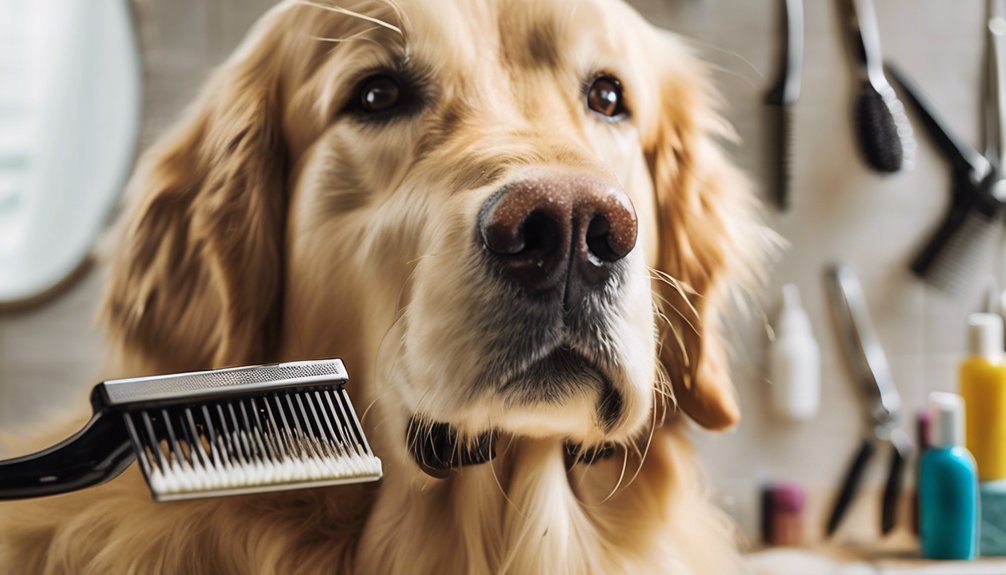
To maintain your pet's coat health, veterinarians recommend a consistent grooming routine tailored to their specific needs.
Using appropriate brushing techniques and grooming tools is essential for keeping your furry friend's coat in top condition. Here are some tips to consider:
- Choose a brush suitable for your pet's coat type.
- Brush regularly to prevent mats and tangles.
- Use grooming tools like combs and deshedding blades for effective results.
- Schedule grooming sessions that align with your pet's shedding cycle.
The Importance of Vaccinations for Skin Health
Grooming isn't the only factor in maintaining your pet's skin and coat health; vaccinations play a vital role too.
Different vaccination types, such as those for distemper or rabies, help bolster your pet's immune response, protecting them from diseases that can affect their skin. A weakened immune system can lead to skin infections, irritations, and more serious conditions.
By ensuring your furry friend is up-to-date on vaccinations, you're not only safeguarding their overall health but also enhancing their coat vitality.
Regular vet visits will help determine the best vaccination schedule, tailored to your pet's needs.
How Regular Check-ups Can Identify Allergies
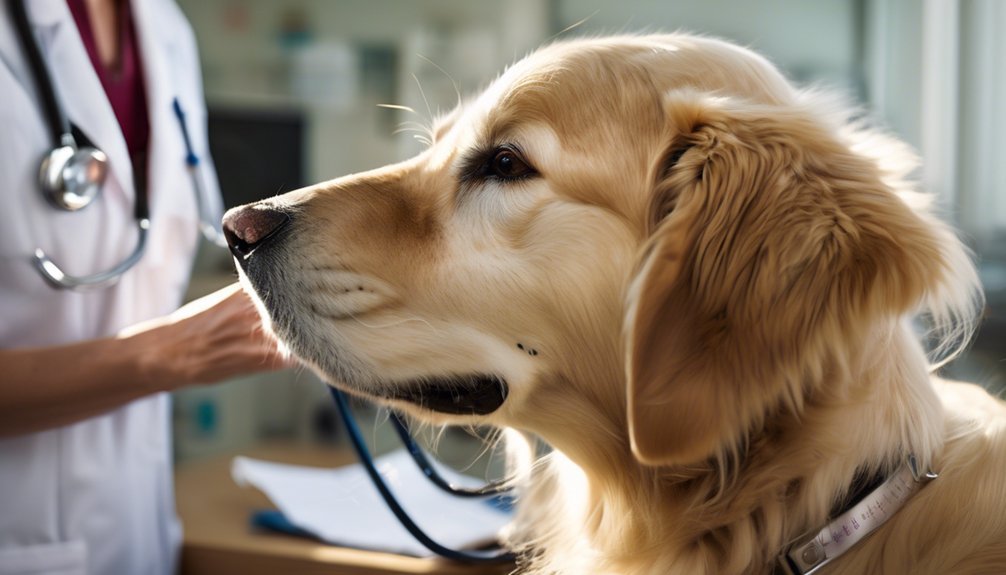
Since allergies can manifest in various ways, regular vet check-ups are essential for identifying potential skin issues early on.
During these visits, your vet can help you recognize allergy symptoms and their impact on your pet's coat health. Early detection means you can manage skin reactions before they escalate.
- Persistent itching or scratching
- Red or inflamed skin
- Hair loss or thinning
- Unusual odors from the skin
The Benefits of Professional Coat Treatments
While regular vet check-ups are crucial for maintaining your pet's coat health, professional coat treatments can offer significant benefits that go beyond basic care.
These treatments include specialized coat conditioning that enhances your pet's overall coat quality. Professional grooming not only removes dirt and debris but also addresses underlying skin issues that you mightn't notice.
Groomers use high-quality products tailored to your pet's specific needs, promoting a healthy, shiny coat. Moreover, these sessions are an excellent opportunity for a thorough examination, helping to catch any potential problems early.
Building a Routine for Your Pet's Health Care
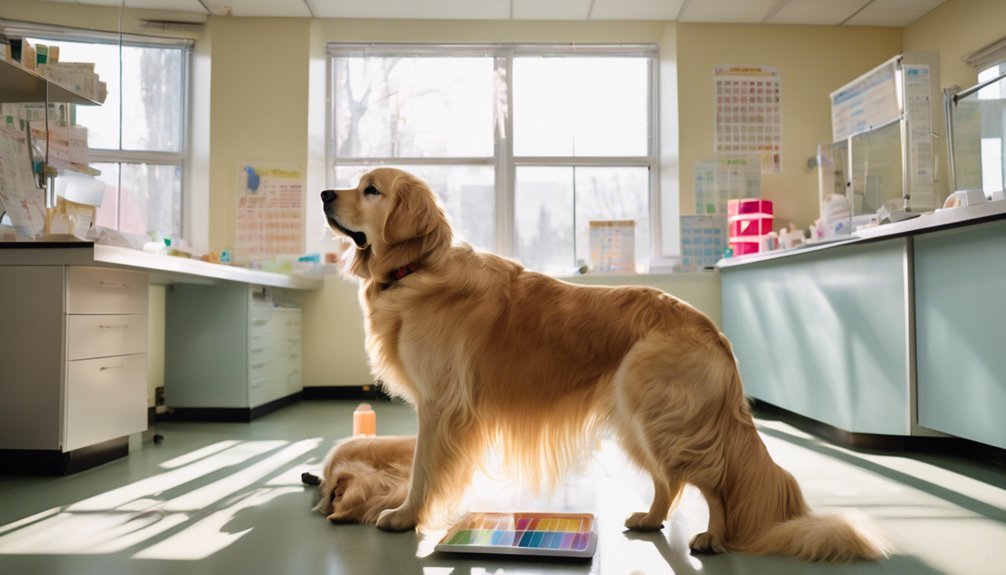
Regular vet check-ups play a vital role in your pet's overall health, but establishing a consistent routine for their health care can significantly enhance their well-being.
A well-structured health schedule ensures your pet receives the necessary attention for optimal pet wellness. Here are some key components to consider:
- Regular vet visits to monitor health changes
- Consistent grooming routines to maintain coat health
- Balanced diet to support overall vitality
- Exercise plans tailored to your pet's needs
Frequently Asked Questions
How Often Should I Schedule Vet Check-Ups for My Pet's Coat Health?
You should schedule vet check-ups every six months to monitor your pet's coat health. Regular grooming and attention during seasonal shedding help maintain their coat's condition, ensuring your furry friend stays happy and comfortable.
What Signs Indicate My Pet Needs a Vet Visit for Coat Issues?
If your pet's scratching is relentless or you notice excessive shedding, these could signal underlying coat issues. Keep an eye out for redness or bald spots, and don't hesitate to consult your vet for guidance.
Can Stress Affect My Pet's Coat and Skin Health?
Yes, stress can significantly impact your pet's coat and skin health. Proper stress management is crucial, as stress can lead to various skin conditions, making regular check-ups important to ensure your furry friend stays healthy and happy.
Are Certain Breeds More Prone to Coat Health Problems?
Did you know that certain breeds, like the Afghan Hound, can have up to 70% more coat care needs? Understanding breed characteristics helps you provide tailored care, ensuring your pet's coat stays healthy and vibrant.
How Can I Prepare My Pet for a Vet Check-Up?
To prepare your pet for a vet check-up, create a pre-visit checklist. Use calming techniques like gentle handling and soothing words to ease their anxiety, ensuring a smoother experience for both of you during the appointment.
Conclusion
Regular vet check-ups are like a safety net for your pet's coat and overall health. They help catch skin issues early, ensuring a shiny, healthy coat that reflects your pet's vitality. Imagine running your fingers through a soft, vibrant fur, free from irritation and pests. By prioritizing these visits, you're not just maintaining a beautiful coat; you're safeguarding your furry friend's well-being and happiness. Keep that tail wagging and those whiskers twitching with regular care!





